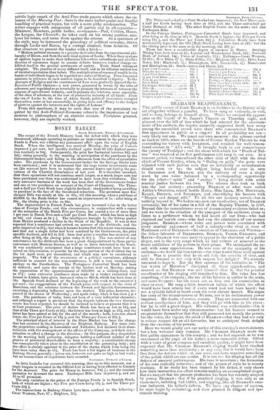BRAHAM'S REAPPEARANCE.
THE public career of JOHN BRARAM is an incident in the history of his art altogether without a parallel. To have sung so variously, so well, and so long, belongs to himself alone. While we awaited hie appear- ance on the boards of St. James's Theatre on Thursday night, and glanced over the bill of fare which he had selected for the entertain- ment of his auditors, the inquiry naturally suggested itself, how many among the assembled crowd were there who remembered BRAHAN'S first appearance in public as a singer? In all probability not ten— very likely not one. We taxed our own memory : the scheme carried us back to 1805, when on the boards of Covent Garden Theatre he was contending for victory with INCLEDON, and recalled the well-remem- bered contest in " All's well." It brought back to our remembrance the victory of Trafalgar ; and the shout with which his "Death of Nel- son" was received at its first performance still rang in our ears. At a remoter period, we remembered the other trial of skill with the rival chiefs of Covent Garden, when, in " Gallop on gaily," the parts were adjusted with such jealous care that no inferiority or subordination should seem or be ; the subject being handed over in turn to INCLEDON and BRAMAN, and the delivery of even a single word by one voice balanced by a corresponding opportunity for the other—" spirit" and "energy " being divided with strict musical justice between the two. The scheme then took us back into the last century ; presenting BRAMAN at what were called Ashley's Oratorios, seated beside MARA, Miss LEAK, Mrs. MOUNTAIN, KELLY, DIGNUM, and INCLEDON, and electrifying his hearers with "Deeper and deeper still." To all this our memory served—but to nothing beyond it. We had to summon our recollection, not of BRAMAN personally, but of his name in a bill of the Royalty Theatre, in 1787. Beyond this the remembrance even of documentary evidence failed us; and we were in the situation of the youngest of the audience, about to listen to a performer whom we had heard all our lives—who had charmed our boyish ears—who had won the admiration of our mature judgment. Baer:um—whose voice and person were associated with every musical enjoyment of half a century—the rival at once of HARRISON and of INCLEDON—the associate of CIMAROSA and WINTER— the fellow -labourer Of BILLINGTON, STORACE, FODOR, GRASSINI, and BANTI—BRAHAM was once more to appear in the character of a public singer, and in the very songs which he had written or selected as the fittest exhibition of his powers in their prime. We anticipated the re- sult with some apprehension. He was sure of the sympathy of his audience—we knew his iron nerves—but what would these avail against age ? Was it possible that he should defy the assaults of time, and still be listened to not only with respect but delight ? We scarcely ventured to hope it. But the first sentence of his recitative in " The last words of Marmion " dissipated all these apprehensions, and assured us that BRAMAN was still himself—that is, that the peculiar excellencies of his singing still remained to him. His voice has lost something of its compass ; the use of his falsetto is earlier in the scale, and more frequent: but his tones are as firm and his enunciation as clear as ever. He sang a little American ballad, of which the effect would have been utterly lost if every word had not been heard: but not a syllable failed to reach even the most distant hearer. His organ has none of the tremulousness of RUBINI, nor is its declamatory power impaired. His faults, of course, remain. They are connected with our earliest recollections of him, and they will go with him to his grave : but he is still a great singer. His welcome was enthusiastic—this it would have been under any circumstances : but his hearers seemed to congratulate themselves that they still possessed not merely the person, but the voice, the vigour, the mind of BRAHAM—that they had not only to evince respect for an old favourite, but to anticipate fresh delight from the exercise of his powers.
Here we would gladly end our notice of this evening's entertainment, but a less welcome duty remains. Mr. CHARLES Bitansat made his first public appearance in this country ; and we had augured, as he was announced as the pupil of his father, a more successful debut. Gifted with a voice of great compass and excellent quality, it might have been expected that Mr. CHARLES BRAHAN'S singing would have reached something more than mediocrity ; at any rate, that it would have been free from the defects which 3rt can cure, and have acquired something
of the polish which art can confer. It is not so : his singing has all the defects of amateur performance. His tune is uncertain ; the formation of his tone radically defective ; and of the graces of style he is utterly destitute. If he really has been trained by his father, it only shows
how little instruction can effect towards making an accomplished singer. But we suspect that his present profession has been but recently adopted by young BRAMAN ; that if he practised singing, it was only as an amusement, imbibing bad habits, and copying, like all BRAN'S ama- teur imitators, his father's defects. To have any chance of success, he must begin by unlearning, and then proceed to diligent and sys- tematic training.


























 Previous page
Previous page